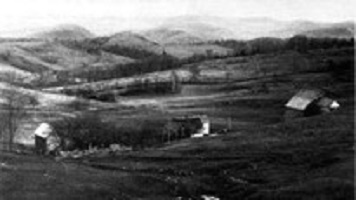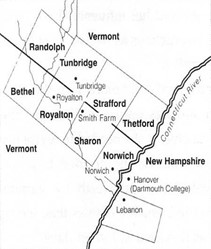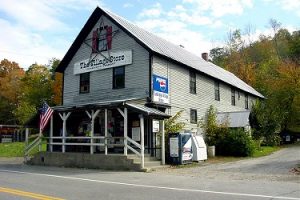

Tunbridge is known for covered bridges still standing and used.Joseph Smith was born in Sharon, Vermont but the history of the Smith family in Vermont has been much earlier than that. Tunbridge is also the ancestral homeland to Brigham Young and many other of the early leaders of the Church of Jesus Christ of Latter day Saints, coincidence or not?
The town of Tunbridge was created on September 3, 1761 by way of a royal charter which King George III of England issued to Governor Benning Wentworth of New Hampshire.
The name Tunbridge was chosen by Wentworth and most likely in honor of (or to gain favor with), the English noble William Henry Nassau de Zuylestein (1717-1781), fourth Earl of Rochford, Viscount Tunbridge, Baron Enfield and Colchester. De Zuylstein’s secondary title is derived from the old “royal borough” of Tunbridge Wells (sometimes Royal Tunbridge Wells) in England.
Just before dawn on October 16, 1780 the town line of Tunbridge and Royalton was witness to the last major raid of the Revolutionary War in New England. In the “Royalton Raid” three hundred Indians led by British soldiers headed down from Canada along the First Branch of the White River. Part of a series of raids designed to terrorize frontier settlements, the result was the destruction of dozens of homes, and crops and livestock necessary to survive the coming winter. Although women and girls were not harmed, 28 men and boys were taken captive and marched to Canada to be imprisoned. In the years that followed, many of the captives made their way back to their families, but some never returned. One resident, Peter Button, was killed in Tunbridge near the Royalton town line along what is Route 110 today. A historic marker has been erected there.
- Asael Smith, (Joseph Smith Sr’s father), first acquired land in Atunbridge in 1791.
- Joseph Smith Sr. moved to Tunbridge with Jesse, his brother, shortly after the purchase in 1791 to clear land for their father.
- Stephen Mack, Lucy Mack Smith’s (Joseph Smith’s mother), brother left Gilsum, New Hampshire in 1793 and moved to Tunbridge and thrived as a merchant.
- Lucy Mack, a year later in 1794 went to visit his brother in Tunbridge. She also lived in Gilsum. A year later, 1795, she returned to spend a little time with Stephen only this time staying a little longer which resulted in meeting, courting, and marrying Joseph Smith Sr. Lucy spoke of the Smith’s as “a worthy, respectable, amiable, and intelligent family.”
- Joseph and Lucy are married in Tunbridge in 1796. Asael provided his son part ownership of a “handsome” four-year-old farm to start them off. In additional Lucy’s brother Stephen with his partner, John Mudget gave Lucy $1,000 dowry. (Lucy Smith purchased her household furnishings with other resources and saved this money as a cash reserve.)
- In the next 23 years, the Smith family would move more than 10 times before leaving for Palmyra in 1816.
 Joseph Smith Sr and Lucy captured by artist Michael Bedard
Joseph Smith Sr and Lucy captured by artist Michael Bedard
The children born to Joseph and Lucy in Tunbridge:
- First son, unnamed, died in childbirth 1797
- Alvin 1798
- Hyrum 1800
- Sophronia 1803
- Samuel Harrison 1808.
The Smith Religious climate:
- Asael and his two eldest sons, Jesse and Joseph Sr. organized a Universalist society in Tunbridge. (https://en.wikipedia.org/wiki/Unitarian_Universalism)
- In 1797, 17 members of the Tunbridge Universalist Society asked to be exempted from ecclesiastical taxes. Asael was the group’s moderator and Joseph and Jesse were among the 17.
- Lucy began attending Methodist meetings in Tunbridge and Joseph Sr. obligingly accompanied her. The news of this angered Asael and Jesse, who pressed Joseph to stop. Lucy reported that one day Asael came to the door and threw Tom Pain’s age of reason into the house and angrily bade him read that until he believed it. (Bushman) While the details are somewhat out of character for Asael (Lucy told the story only in her draft manuscript), it is not surprising that Asael should oppose Joseph Sr.’s association with an evangelical church. Universalists thought evangelical belief slandered a loving heavenly father. If grace could save one, it could save all. There was no need for the anxiety, humiliation, and depression of rebirth. Asael was understandably disgusted with Joseph for listening to Methodists, who preached little else but conversion. Asael may have thrown Paine at his son to startle him into reconsideration. (Bushman).
-
Asael Smith wrote an address to his family in 1799. In it, he wrote, “The soul is immortal. …Do all to God in a serious manner. When you think of him, speak of him, pray to him, or in any way make your addresses to his great majesty, be in good earnest. …And as to religion, study the nature of religion, and see whether it consists in outward formalities, or in the hidden man of the heart. …”Sure I am my Savior, Christ, is perfect, and never will fail in one circumstance. To him I commit your souls, bodies, estates, names, characters, lives, deaths and all – and myself, waiting when he shall change my body and make it like his own glorious body.”
The Smith’s political activity:
“Beginning in 1793, Asael was frequently elected one of three selectmen to manage the town affairs; he occasionally served as moderator and highway surveyor. His sone Jesse was chosen trustee of the school district when it opened in the Southern portion of the town near the Smith farms later was elected selectman and town clerk.” (Bushman)
The Smith’s Land transactions:
“Asael purchased 83 acres of uncleared land in Tunbridge in 1891. He sent his 2 oldest sons, Jesse and Joseph’s ages twenty-three and twenty, to clear the Tunbridge land before the family’s arrival the next spring…. In November 1891, the Smith’s crowded into the fourteen-by-ten foot hut built by Jesse and Joseph an dprepared for the Vermont winter.” In 1803, Joseph Sr. & Lucy Mack sold their farm, which was worth about $1500, for $800. Lucy said, “My husband sold for $800 in order to make a speedy payment on the Boston debt; and , as I had not used the check of one thousand dollars, which my brother and Mr. Mudget gave me, I added it to the eight hundred dollars obtained for the farm, and by this means the debt was liquidated.l” By 1802, the Smith’s had a compound of adjourning farms totaling betwen 300 and 400 acres.
 Tunbridge town showing with other communities
Tunbridge town showing with other communities
Moves involving Tunbridge:
- Joseph Sr. & Lucy Mack live in Tunbridge from 1896 to 1802. In 1802, the Smith’s leave Tunbridge and rent out their Tunbridge house and land and move to Randolph, a village seven miles to the west
- In the spring of 1803, the Smith’s return from Randolf to their Tunbridge farm
- In 1803, the Smith’s move to Royalton for a few months after they sell the farm in Tunbridge.
- By March 13, 1808, the Smith’s return to Tunbridge, (Samuel Harrison Smith is born here in 1808.)
- By March 13, 1810, the Smith’s move back to Royalton.
- Asael an Mary Duty, Joseph Jr’s grandparents leave Tunbridge between 1811 and 1820, Asael and Mary and at least seven of the eleven children moved from Tunbridge. Six of the seven settled around their parents in Stockholm and Potsdam in St. Lawrence County, New York.
 Joseph Smith Sr. and Lucy Mack married in this building in 1796
Joseph Smith Sr. and Lucy Mack married in this building in 1796
Lucy Mack Smith Pursues religious learnings in Tunbridge and has a significant dream
“While we were living in the town of Tunbridge…. I commenced attending Methodist meetings, and in order to oblige me, my husband accompanied me; but when this came to the ears of his oldest brother, he was so displeased and said so much in regard to the matter that my husband thought it best to desist. He said that he considered it hardly worth our while to attend the meetings any longer as it would prove of but little advantage to us; besides this, it gave our friends such disagreeable feelings. I was considerably hurt by this, yet I made no reply, I retired to a grove not far distant, where I prayed to the Lord in behalf of my husband–that the true gospel might be presented to him and that his heart might be softened so as to receive it, or, that he might become more religiously inclined. After praying some time in this manner, I returned to the house much depressed in spirit, which state of feeling continued until I retired to my bed. I soon fell asleep and had a a dream. In it, She saw a meadow with two trees. “one of them was surrounded with a bright belt, that shone like burnished gold.” The other one “was not surrounded with the belt of lights as the former, and it stood erect and fixed as a pillar of marble.” When winds came, the one was rigid, but the other flexible. She said the conclusion given her was that, “these personated my husband and his oldest brother, Jesse Smith; that the stubborn tree was like Jess, that the other, more pliant and flexible was like Joseph, my husband, that the breath of heaven, which passed over them, was the pure and undefiled gospel of the Son of God, which gospel Jesse would always resist, but which Joseph, when he was more advanced in life, would hear and receive with his whole heart, and rejoice therein; and unto him would be added intelligence, happiness, glory, and everlasting life.”
Compiled by Karl Ricks Anderson. It is extracted from Lucy Mack Smith, Richard Bushman, Richard L. Anderson, Lavina Fielding Anderson and other sources.
